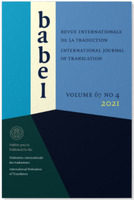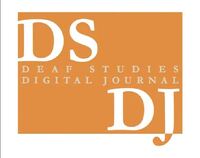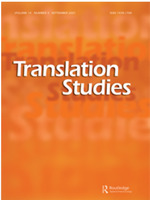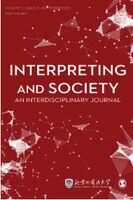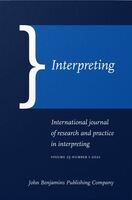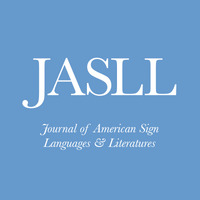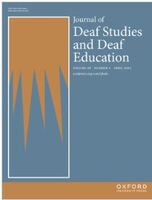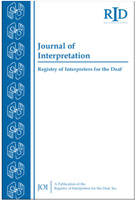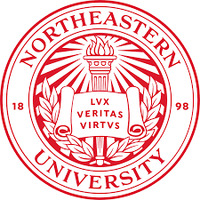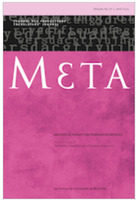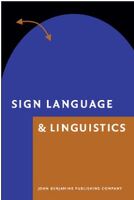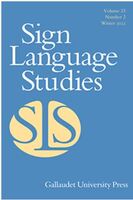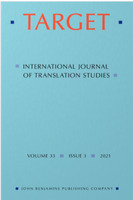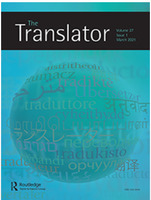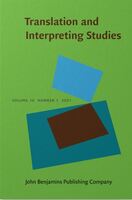Scholarly Journals
Welcome to InterpNET's Scholarly Journals page where you will find professional journals published in the field of signed language, interpretation, and translation.
Our curated collection of web links connects you to publishing company websites that host a variety of peer-reviewed journals. These journals are an essential resource for anyone seeking to keep up with the latest research and trends in the field of signed language interpretation.
Whether you're a student looking to explore academic articles on specific topics, or an interpreter educator looking for a trusted resource to recommend to your students, our Scholarly Journals page has something for you. With a wide range of journals covering various topics in the field, you're sure to find something of interest.
By providing a one-stop location for accessing trustworthy academic articles, we aim to make it easier for students of signed language interpreting to engage in independent research and learning. Interpreter educators can also benefit from our page by having a comprehensive resource to recommend to their students.
At InterpNET, we believe in the power of knowledge-sharing and collaboration to advance the field of signed language interpretation. Our Scholarly Journals page is just one way we're working to make information more accessible to all who seek it.
So why wait? Explore our collection of scholarly journals today and discover the latest research and insights in the field of signed language interpretation. Thank you for choosing InterpNET as your trusted resource for professional journals.
-
American Annals of the Deaf
The American Annals of the Deaf is a professional journal dedicated to quality in education and related services for deaf or hard of hearing children and adults. First published in 1847, the Annals is the oldest and most widely read English-language journal dealing with deafness and the education of deaf persons. The Annals is the official organ of the Council of American Instructors of the Deaf (CAID) and of the Conference of Educational Administrators of Schools and Programs for the Deaf (CEASD) and is directed and administered by a Joint Annals Administrative Committee made up of members of the executive committees of both of these organizations. For more than 170 years the Annals has focused primarily on the education of deaf students and on information for professionals associated with the educational development of these students. At the same time, the Annals historically has extended its range of topics beyond education and incorporated the broad interests of educators in the general welfare of deaf children and adults to represent the diversity of its professional readership. Among the topics covered in its pages are: Communication methods and strategies, Language development, Mainstreaming and residential schools, Parent-child relationships, and Teacher training and teaching skills. Each year the Annals publishes four literary issues (Spring, Summer, Fall, and Winter) and an annual reference issue of schools and programs in the United States and Canada for students who are deaf or hard of hearing and their teachers. The reference issue has become widely known for its comprehensive listings, which include names, addresses, telephone numbers, and other information for hundreds of schools and programs nationwide. The reference issue also provides demographic, audiological, and educational data about students who are deaf or hard of hearing and the schools they attend. -
Babel
Babel is a scholarly journal designed primarily for translators, interpreters and terminologists (T&I), yet of interest also for non-specialists concerned with current issues and events in the field. The scope of Babel is intentional and embraces a multitude of disciplines built on the following pillars: T&I theory, practice, pedagogy, technology, history, sociology, and terminology management. Another important segment of this journal includes articles on the development and evolution of the T&I professions: new disciplines, growth, recognition, Codes of Ethics, protection, and prospects. The creation of Babel was proposed on the initiative of Pierre-François Caillé, founding president of the Fédération Internationale des Traducteurs (FIT) and approved by the first FIT Congress of 1954 in Paris. Babel continues to be published for FIT and each issue contains a section dedicated to THE LIFE OF FIT. Articles for Babel are normally published in English or French but we also accept articles in Arabic, Chinese, German, Italian, Russian and Spanish. Babel is published for the International Federation of Translators (FIT). -
CIRIN
Welcome to the Web site of CIRIN, an international information network on research into conference interpreting. The network was set up in Paris in 1990. Its purpose was to facilitate the circulation of CIR information in a situation where such research was being carried out by individuals and very small groups worldwide with little contact between them. Meanwhile, the communication situation has improved dramatically, with many international meetings, many journals and wide use of the Web. Nevertheless, reactions from readers suggest that the Bulletin is still considered useful, especially in view of the fact that access to printed publications remains expensive and out of the reach of many institutions and colleagues. CIRIN is independent, with no financial or institutional link with any academic or non-academic organization. The main information vector of CIRIN is the Bulletin, which is published twice a year, in January and July. During the first years of its existence, it was produced on paper, and National Nodes distributed it locally. It is now fully electronic, and the role of the Nodes has become mainly symbolic. Another tool made available to the CIR community in 2021 is the CIRIN Bibliography, a working document - see the link above. CIRIN is funded by the editor, has no other source of income and cannot subscribe to publications or purchase them. It therefore relies on the editor's and contributors' regular scrutiny of texts which become available to them.The editorial philosophy of CIRIN can be summarized as follows: 1. Be as comprehensive as possible with respect to CIR publications, including 'grey literature'. 2. Focus on CIR (and media interpreting). The establishment of similar networks devoted to other branches of interpreting would be most welcome. 3. Be as informative as possible.The website was initially meant to be an electronic version of the network and the Bulletin. It is also used as the editor's personal academic site - see personal pages. The last issue of the Bulletin is posted on the site at any time. For back issues, please write to the editor at daniel.gile@yahoo.com -
Deaf Studies Digital Journal
The Deaf Studies Digital Journal (DSDJ) is a peer-reviewed, online journal dedicated to advancing the cultural, creative and critical work in and about signed languages and their communities. A multilingual publication, DSDJ features both signed and written languages, primarily, but not limited to, American Sign Language, International Sign Language, and English. The Deaf Studies Digital Journal offers critical essays in Deaf Cultural Studies, original works of signed literature, visual art, film, video, interviews, reviews, historical sources, and community news. The contributions to this journal contribute to a body of critical and creative work in Deaf Studies while furthering innovative ways of publishing in the digital humanities. -
International Journal of Interpreter Education
The International Journal of Interpreter Education (IJIE) is a pioneering journal covering topics of interest to all those researching and working in interpreter education. The Editors welcome material on any aspect of interpreter education theory, policy, application or practice that will advance thinking in the field. IJIE addresses issues of current and future concern to interpreter educators, encouraging interdisciplinary discussion. -
International Journal of Translation and Interpretation Studies
IJTIS is a double-blind peer-reviewed, open-access journal by Al-Kindi Center for Research and Development, United Kingdom. It is designed to disseminate knowledge and research relevant to all areas of Translation and interpretation. IJTIS seeks to address broad, common concerns among scholars working in various areas of translation and interpreting studies, while encouraging sound empirical research that could serve as a bridge between academics and practitioners. Finally, IJTIS is a forum for the dissemination in English translation of relevant scholarly research originally published in languages other than English. -
Interpreting & Society : An Interdisciplinary Journal
As the social and behavioral sciences have increasingly built on the ‘science’ part of the name, creating a body of qualitative, quantitative and evaluative research methods has become the foundation of these disciplines’ future in the broader world. Beginning in 1972, our robust list of publications and digital resources has grown to help you at every step of your research journey, including textbooks that lay out the fundamentals of the research process, journals that highlight the latest methodological innovations, the SAGE Research Methods platform that combines a library of methods texts and original content with interactive tools to guide researchers at any level, and the online community MethodSpace. -
Interpreting: International Journal of Research and Practice in Interpreting
Interpreting serves as a medium for research and debate on all aspects of interpreting, in its various modes, modalities (spoken and signed) and settings (conferences, media, courtroom, healthcare and others). Striving to promote our understanding of the socio-cultural, cognitive and linguistic dimensions of interpreting as an activity and process, the journal covers theoretical and methodological concerns, explores the history and professional ecology of interpreting and its role in society, and addresses current issues in professional practice and training. Interpreting encourages cross-disciplinary inquiry from such fields as anthropology, cognitive science, cultural studies, discourse analysis, language planning, linguistics, neurolinguistics, psychology and sociology, as well as translation studies. Interpreting publishes original articles, reports, discussions and book reviews. -
JADARA
JADARA is a widely read publication which deals with research findings (pragmatic applications), program descriptions and articles on deafness, and the disciplines of rehabilitation, social services, mental health, and other related areas. -
Journal of American Sign Languages & Literatures
The Journal of American Sign Languages and Literatures (JASLL) offers a permanent home for ASL publications in its most natural and accessible medium – video. A video-based medium provides a space for leading educators, researchers, and storytellers to share their work with the public in signed language. Most importantly, JASLL urges a paradigm shift in how peer-reviewed publications need not be limited to text, but can encompass video publications and articles. JASLL also provides an opportunity for Deaf communities to access scholarly information through their primary and natural language, signed language. JASLL is a locus of past, present, and future academic or creative works rendered in sign languages native to the geo-political boundaries of the United States including but not limited to American Sign Language (ASL), Black ASL, Hawaii Sign Language (HSL), Lengua de Señas Mexicana (LSM), North American Indian Sign Languages (NAISL) and Puerto Rican Sign Language (PRSL). JASLL is a multi-disciplinary journal that revolves around themes such as, but are not limited to, history, literature, linguistics and education. JASLL is an independent, peer-reviewed, open-access digital journal committed to promoting the nationwide dissemination of original sign language-related research and literature. We believe scholarship of and about deaf people and sign languages should be free and accessible, particularly for marginalized Deaf communities. The opinions expressed by authors in their publications are the author’s own and do not reflect the views of JASLL. JASLL is sponsored and maintained by a non-profit organization, ASLized. All JASLL editors, the JASLL associate and editorial board, web designers, video editors and the ASLized board and more are fully volunteer-based. All of this would not be possible without volunteers and your contributions. Thank you. -
Journal of Deaf Studies and Deaf Education
The Journal of Deaf Studies and Deaf Education is a peer-reviewed scholarly journal integrating and coordinating basic and applied research relating to individuals who are deaf, including cultural, developmental, linguistic, and educational topics. JDSDE addresses issues of current and future concern to allied fields, encouraging interdisciplinary discussion. The journal promises a forum that is timely, of high quality, and accessible to researchers, educators, and lay audiences. Instructions for contributors appear at the back of each issue. The journal consists of four issues per year, including occasional Special Issues. -
Journal of Interpretation
The Journal of Interpretation (JOI) is a scholarly publication of the Registry of Interpreters for the Deaf that includes articles, research reports and commentaries relevant to the interpreting field. The JOI reflects a broad, interdisciplinary approach to the interpretation and translation of languages. -
Journal of Undergraduate Interpreting Research
Welcome to the Journal of Undergraduate Interpreting Studies, a project of the National Interpreter Education Center (NIEC) at Northeastern University. The primary goal of the Journal is to showcase and share undergraduate research. A secondary goal is to encourage interpreter education programs to incorporate undergraduate research into their curriculums. We also hope that the Journal will become a resource for students in interpreter education programs -
Meta
Meta : Journal des traducteurs / Meta: Translators' Journal, deals with all aspects of translation and interpretation: translation studies (theories of translation), teaching translation, interpretation research, stylistics, comparative terminological studies, computer-assisted translation (machine translation), documentation, etc. While aimed particularly at translators, interpreters and terminologists, the publication addresses everyone interested in language phenomena. -
Sign Language & Linguistics
Sign Language & Linguistics is a peer-reviewed, international journal which aims to increase our understanding of language by providing an academic forum for researchers to discuss sign languages in the larger context of natural language, crosslinguistically and crossmodally. SLL presents studies that apply existing theoretical insights to sign language in order to further our understanding of SL; it investigates and expands our knowledge of grammar based on the study of SL and it specifically addresses the effect of modality (signed vs. spoken) on the structure of grammar. -
Sign Language Studies
Founded by William C. Stokoe, known by many as the father of the linguistics of American Sign Language, this quarterly journal presents a singular forum for groundbreaking research on the language, culture, history, and literature of signing communities and signed languages. The first journal published in the field, SLS continues to offer fresh content with a uniquely international, multidisciplinary focus. -
Target
Target is a double-blind peer-reviewed journal aiming to promote the interdisciplinary scholarly study of translational phenomena from any part of the world and in any medium. The journal presents research on various forms of translation and interpreting approached from historical, cultural, literary, sociological, linguistic, cognitive, philosophical, or other viewpoints that may be of relevance to the development of the discipline. It aims to combine the highest scholarly standards with maximum transparency and reader-friendliness. Target welcomes articles with a theoretical, empirical, or applied focus. It has a special preference for papers that somehow combine these dimensions and for those that position themselves at the cutting edge of the discipline. The purpose of the review section is to introduce and critically discuss the most important recent publications in the field and to reflect its evolution. The journal periodically zooms in on specific topics or areas by means of guest-edited special issues. It also welcomes shorter position papers to encourage open discussion in a “Forum” section of the journal. To facilitate involvement of authors, referees, and readers from the whole world, the official language of publication of Target is English. To minimize the adverse effects of such a policy and honor the journal’s core topics of multilingualism and translation, Target runs an active and collaborative multilingual companion website, which welcomes translations into a wide range of languages of recent or older articles and reviews from the journal. -
The Translator
The Translator is a peer-reviewed international journal that publishes original and innovative research on a variety of issues related to translation and interpreting as acts of intercultural communication. By welcoming work based on a range of disciplinary perspectives and methodologies, The Translator supports both researchers and practitioners, providing a meeting point for existing as well as developing approaches. It aims to stimulate interaction between various groups who share a common interest in translation as a profession and translation studies as a discipline. Contributions cover a broad range of practices, written or oral, including interpreting in all its modes, literary translation and adaptation, commercial and technical translation, translation for the stage and in digital media, and multimodal forms such as dubbing and subtitling. The journal invites submissions of research articles, interviews, scholarly contributions based on reflexive practice, review essays, and book reviews. Manuscripts are subject to initial appraisal by the editors, and, if found suitable for further consideration, to peer review by independent, anonymous expert referees. All peer review is double blind and submission is by email to the editors. Extended special issues guest-edited by leading scholars are published regularly and proposals are welcome -
Translation & Interpreting
Translation & Interpreting is a refereed international journal that seeks to create a cross-fertilization between research, training and professional practice. It aims to publish high quality, research-based, original articles, that highlight the applications of research results to the improvement of T&I training and practice. It welcomes contributions not only from well-known senior scholars, but also from early-career researchers in the field. Hosted by Western Sydney University, the Journal is universally accessible to researchers, educators, students and practitioners of interpreting and translation, as well as to others interested in the discipline. The Journal does not charge any access or publication fees. Published twice yearly. ISSN 1836-9324 -
Translation & Interpreting Studies
Translation and Interpreting Studies (TIS) is a peer-reviewed journal designed to disseminate knowledge and research relevant to all areas of language mediation. TIS seeks to address broad, common concerns among scholars working in various areas of Translation and Interpreting Studies, while encouraging sound empirical research that could serve as a bridge between academics and practitioners. The journal is also dedicated to facilitating communication among those who may be working on related subjects in other fields, from Comparative Literature to Information Science. Finally, TIS is a forum for the dissemination in English translation of relevant scholarly research originally published in languages other than English. TIS is the official journal of the American Translation and Interpreting Studies Association (ATISA).


